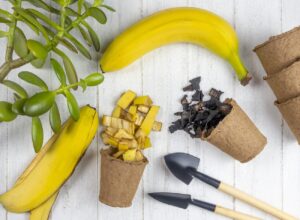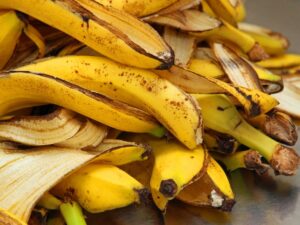Bananas are sweet and nutritious fruits. Many people love them and include them in their daily menu. Banana peels end up in the trash, even though they are an excellent fertilizer for plants—free and natural, rich in potassium, magnesium, phosphorus, calcium, and other useful minerals.
There are several ways to use banana peels as fertilizer. You can fertilize both houseplants and garden plants with them — at any time of the year.
The first method consists of shredding banana peels, using a knife or scissors (this way they break down faster, releasing nutrients, vitamins and minerals into the soil). Add them to the soil at a depth of 5-10 cm. If you want to enrich the soil of your vegetable plot with the help of banana peels, it would be best to bury them in it some time before planting the vegetables.

The second method. Of course, you can use whole banana peels. Bury them in the garden soil. In this case, their decomposition process will be longer. You can use this method of fertilization when the garden is empty to prepare it for the next season, or by adding banana peels around plants, away from their roots: for example, around fruit trees and bushes.

The third method — composting. If you are making your own compost, you can always add banana peels to it to improve its composition.
The fourth method — “banana tea.” Cut the banana peel, place it in a deep bowl and cover it with cold water. Cover the bowl with a lid and set aside for a few days. Allow the banana peel to macerate and ferment. After the fermentation process is over, strain the resulting “tea” and water the plants with it, pouring it on the wet soil. This method is perfect for fertilizing potted plants.





